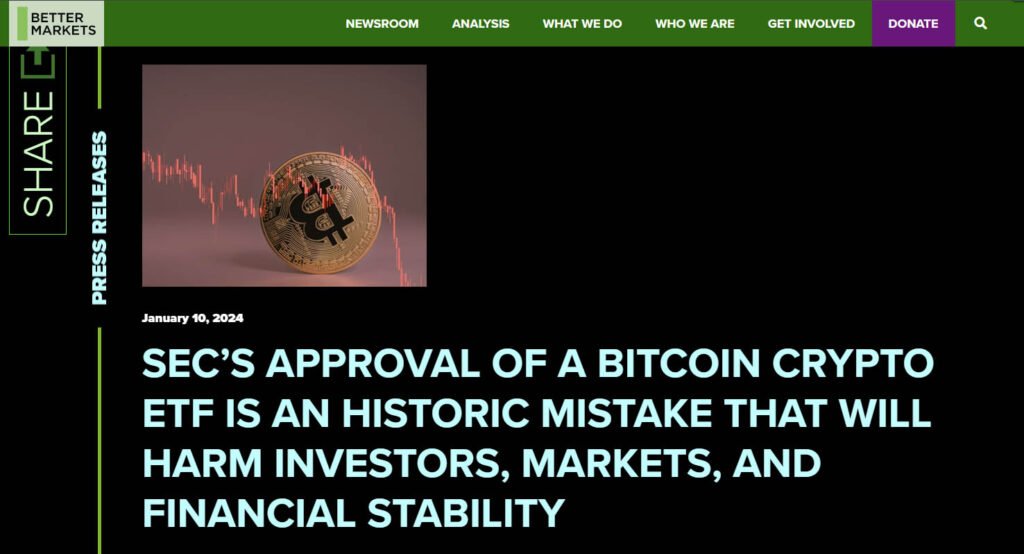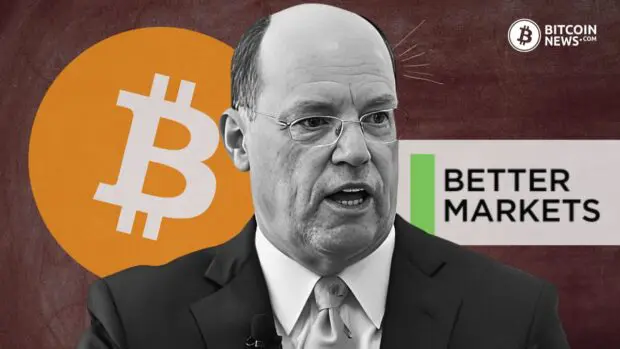The recent approval of Spot Bitcoin Exchange-Traded Funds (ETFs) by the U.S. Securities and Exchange Commission (SEC) has stirred a heated debate, with Better Markets, a non-profit organization advocating financial reform, expressing strong opposition. The organization has raised concerns about potential harm to investors, markets, and financial stability.

Better Markets CEO Dennis Kelleher: Bitcoin ETF is “Historic Mistake”
In an official statement, Dennis Kelleher, Co-founder, President, and CEO of Better Markets, called the SEC’s decision a “historic mistake.” He criticized the approval, stating that it will pave the way for the mass marketing of a known “worthless, volatile, and fraud-filled financial product” to Main Street Americans.
The organization doubles down on its previous statement by thrashing Bitcoin even further, stating:
“The SEC’s action today has changed nothing about this worthless financial product: Bitcoin and crypto still have no legitimate use; remain the preferred product of speculators, gamblers, predators, and criminals; and continue to be cesspools of fraud, manipulation, and criminality […] That’s why this approval of a Bitcoin ETF is an historic mistake that will not only unleash crypto predators on tens of millions of investors and retirees but will also likely undermine financial stability.”
“No Legitimate Use for Bitcoin”, Claims Better Markets
Kelleher argued that despite the SEC’s approval, Bitcoin and digital assets still lack legitimate use and remain the preferred choices of speculators, gamblers, predators, and criminals, a view point that closely resembles those of Jamie Dimon and Senator Elizabeth Warren. He emphasized the absence of SEC regulation or policing in the Spot Bitcoin market.
Addressing the court decision in favor of Grayscale, a digital asset manager, Better Markets contested the notion that the SEC’s defeat compelled them to approve the ETFs. The court merely stated that the SEC failed to adequately explain its prior rejection, according to Kelleher. He highlighted “alarming statistics,” suggesting that a significant portion of Bitcoin trading, up to 95%, could be due to wash trading.
Notably, in a similar statement in mid December, SEC Chair Gary Gensler, hinted that the court ruling in Grayscale-SEC case moved the regulator to reconsider the Spot Bitcoin ETF applications.
The organization added:
“The court in Grayscale merely said that the SEC failed to sufficiently explain its prior rejection. The SEC could — and should have — rejected the ETF applications and better detailed why it did so, importantly including a showing that ‘as much as 77.5% of the total trading volume on unregulated exchanges was due to wash trading’ and as much as 95% of Bitcoin trading ‘could be due to wash trading,’”
Four Levels of “False Comfort” for Investors
Kelleher expressed concerns about the “false sense of security” that the SEC’s approval might bring to investors. He outlined four levels of potential false comfort: the SEC’s approval itself, the involvement of well-known ETF investment vehicles, the participation of traditional financial firms like Blackrock and Fidelity, and the belief in meaningful regulation and investor protections.
SEC Commissioner Joins Criticism
SEC Commissioner Caroline Crenshaw added her voice to the dissent, stating that the agency’s decision was “unsound and ahistorical.” She expressed worry about these products flooding the markets and affecting the retirement accounts of households.
She stated:
“I am concerned that these products will flood the markets and land squarely in the retirement accounts of US households who can least afford to lose their savings to the fraud and manipulation that appears prevalent in the spot bitcoin markets and will impact the ETPs,”
Better Markets Questions Regulatory Effectiveness
Better Markets questioned the effectiveness of regulatory bodies in policing the digital asset industry. The statement criticized Rostin Behnam, the chairman of the Commodities Futures Trading Commission (CFTC), accusing him of being more of a “biased crypto cheerleader” than an independent financial regulator.
An argument raised by Better Markets is the potential increased interconnectedness of digital assets with traditional financial and banking systems. This, it argued, could dramatically heighten the risk of systemic crashes and bailouts, drawing parallels to the decision to deregulate derivatives in 2000’s, that, as asserted by Better Markets, led to the financial crash of 2008.
Community Reactions
The Better Markets report drew numerous feedbacks from Bitcoin community, ranging from comparison to the launch of the internet in 1995, to questions on why the organization is filled with so much hatred towards Bitcoin.
A user compared the recent statements with Clifford Stoll’s, who stated in 1995 that “no online database will replace your daily newspaper.”
Another user draw similarities between the current clash, and the frustration of “horse dealers” with the introduction of automobiles.
Another comment pointed out hard money characteristics of Bitcoin, stating that it is “a better money than dollars”
A user turned to humor, stating astonishment as why Better Markets report is so passionate at bashing Bitcoin.
Yan Pritzker, co-founder and CTO of Swan joined the debate, stating that this argument by Better Markets is “provably” wrong, as he enclosed a thread of Bitcoin’s use cases.
Erik Voorhees, founder of ShapeShift also weighed in on the matter, highlighting Bitcoin’s use case as a wealth preservation method amid inflationary chaos of fiat currencies.
In another comment, a user brought forth a compelling argument, stating that if bitcoin is worthless, it should be easy and cheap to acquire.
Conclusion
The SEC’s approval of Bitcoin ETFs has ignited criticism in Bitcoin skeptics, with Better Markets at the forefront, labeling it a “historic mistake.” The debate hinges on concerns about the lack of regulation in the spot Bitcoin market, potential false assurances for investors, and the broader systemic risks associated with increased digital asset integration into traditional financial systems.
Many Bitcoiners on the other hand, dismiss these arguments as invalid, stating that Bitcoin is hard money, and that approval of Spot Bitcoin ETFs will grant everyday Americans better access to a better and safer monetary system.










